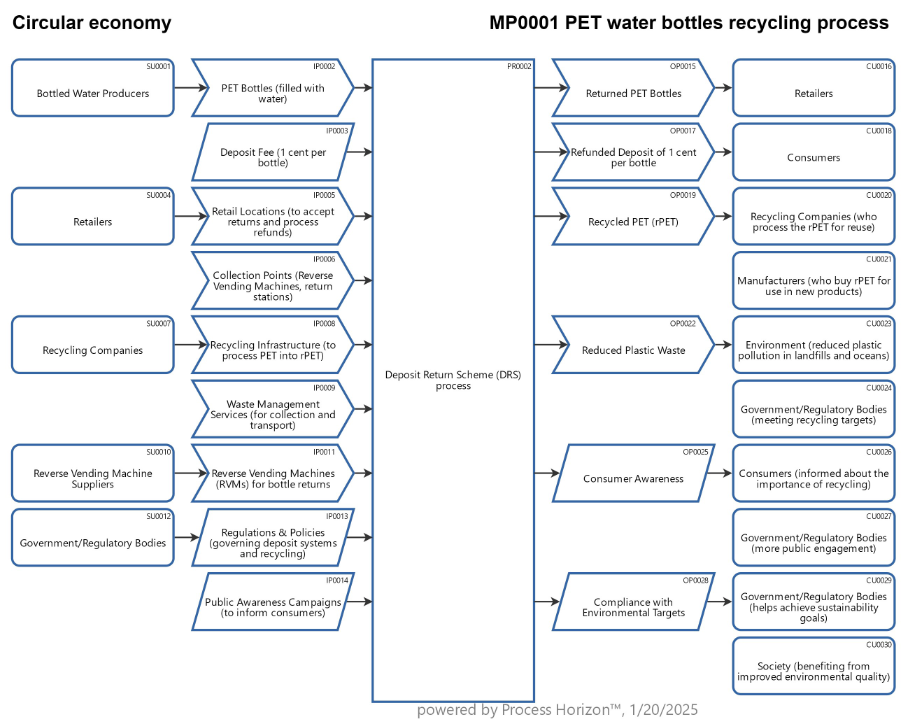Deposit Return Scheme (DRS) for PET water bottles recycling

Recycling PET (polyethylene terephthalate) water bottles offers a range of important environmental, economic and societal benefits.
1. Environmental Protection
- Reduction in Plastic Waste: PET is one of the most commonly used plastics for water bottles. Recycling helps to significantly reduce the amount of plastic that ends up in landfills, rivers, oceans and other ecosystems, which can harm wildlife and contribute to pollution.
- Conservation of Resources: Recycling PET reduces the need for virgin materials (oil and natural gas) to produce new plastic bottles, conserving valuable natural resources.
- Energy Savings: Producing new plastic from recycled PET uses less energy compared to manufacturing it from raw petroleum, which helps reduce carbon emissions and lower the carbon footprint.
2. Economic Benefits
- Job Creation: Recycling PET creates jobs in the collection, sorting, processing and selling of recycled materials. This helps boost the economy and supports local industries.
- Cost Efficiency: Recycled PET (rPET) is often cheaper to produce than new virgin PET, making it an economically viable option for manufacturers. This can help reduce production costs and promote sustainable manufacturing practices.
- Creation of Market for Recycled Materials: As the demand for rPET increases, it creates a stable market for recycled materials, encouraging further investment in recycling infrastructure and technologies.
3. Sustainable Packaging
- Closed-Loop Recycling: PET bottles can be recycled into new bottles, creating a closed-loop system that promotes sustainability. Recycled PET can also be repurposed into other products such as clothing, carpets or insulation, contributing to a circular economy.
- Reduction of Plastic Waste in Oceans: Recycling PET helps minimize the volume of plastic that ends up in the ocean, protecting marine life and preserving biodiversity.
4. Promoting Circular Economy
- Recycling PET supports the transition to a circular economy, where materials are continuously reused, refurbished and recycled instead of being discarded. This system reduces reliance on finite resources and minimizes waste.
5. Consumer Awareness and Responsibility
- Encourages Sustainable Consumer Behavior: Recycling PET bottles promotes environmental responsibility among consumers. When individuals understand the importance of recycling, it can lead to increased participation in recycling programs and reduce littering.
- Corporate Responsibility: Many companies are adopting PET recycling as part of their corporate sustainability goals, using more recycled materials in their packaging and encouraging consumers to recycle.
6. Reduction of Landfill Burdens
- PET bottles are typically non-biodegradable, meaning they can persist in landfills for hundreds of years. Recycling reduces the volume of waste in landfills, helping to manage waste more effectively and prolong the life of landfill sites.
Alone, the potential for Asia relying on bottled water of at least one bottle a day per head for a population of 4.7 billion is thus huge. This enormous consumption presents a significant opportunity and challenge for sustainable practices, such as the implementation of a Deposit Return Scheme (DRS) to improve recycling rates and reduce plastic waste across the region.
In conclusion, systematic recycling of PET water bottles by a Deposit Return Scheme as outlined in my process map offers significant advantages in terms of reducing environmental impact, supporting the economy, promoting sustainability and reducing reliance on virgin resources.
Using the following link you can access this sandbox SIPOC data & process model in the ProcessHorizon web app and adapt it to your needs (easy customizing) and export or print the automagically created visual AllinOne process map as a PDF document or share it with your peers: https://app.processhorizon.com/enterprises/QHdzhXUpQGfjjsfpm86UbjFj/frontend

